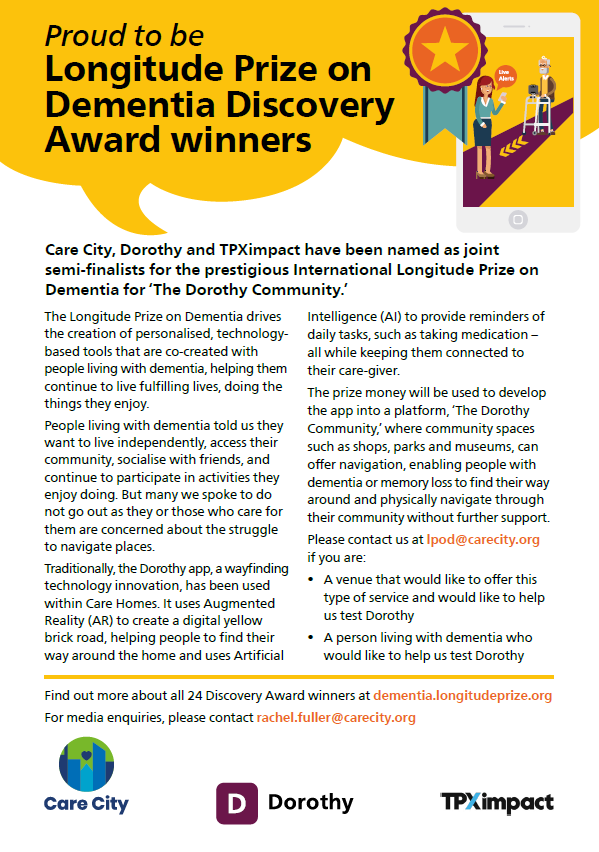Supporting independence for people living with dementia
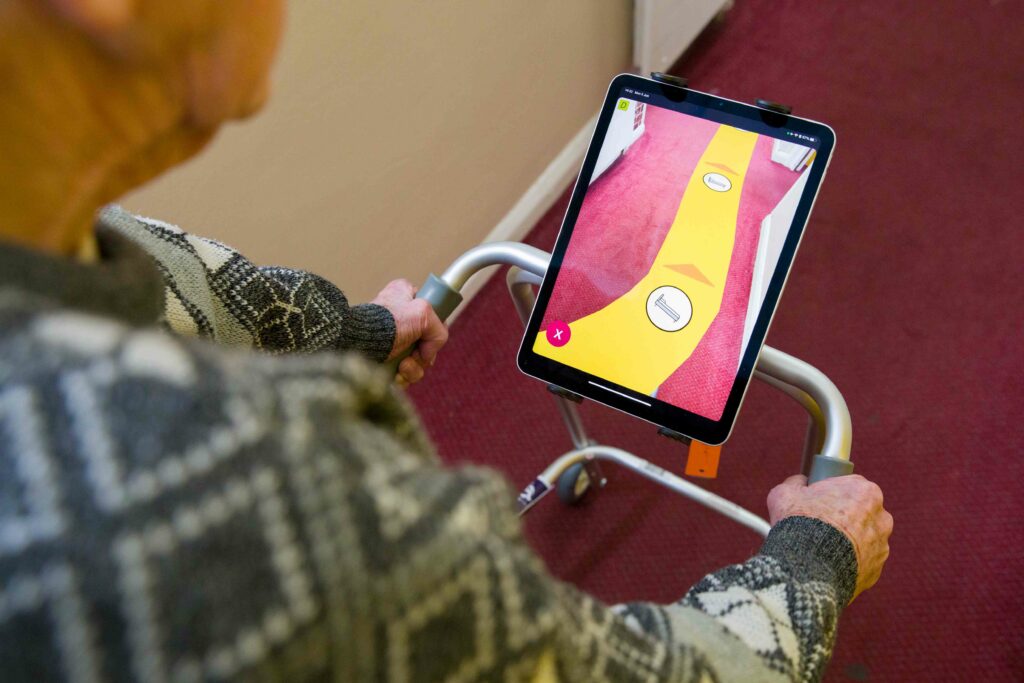
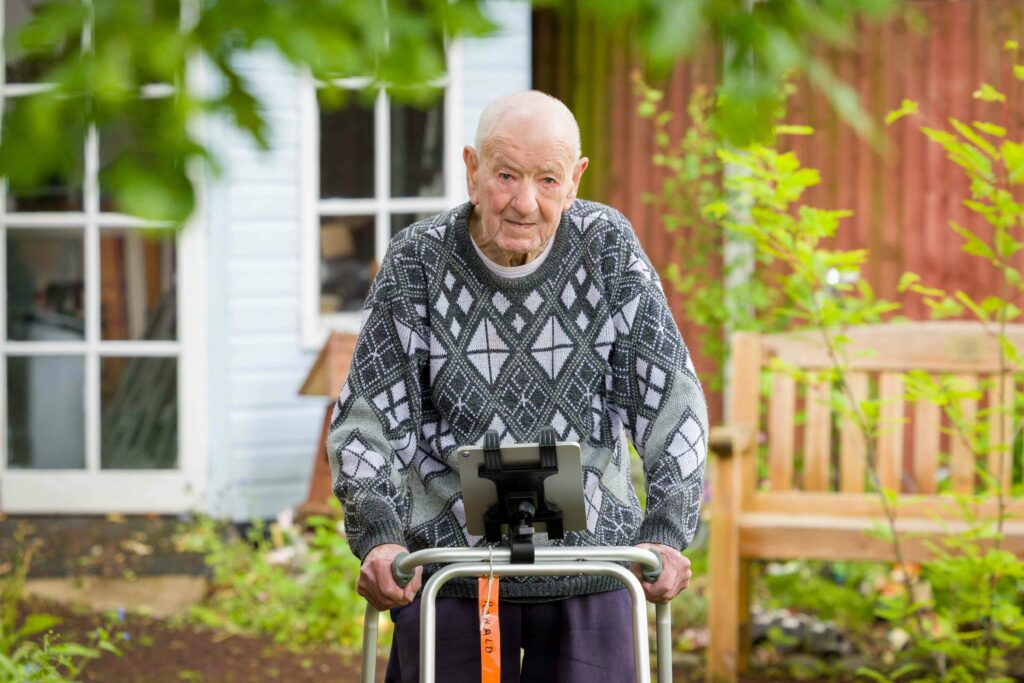
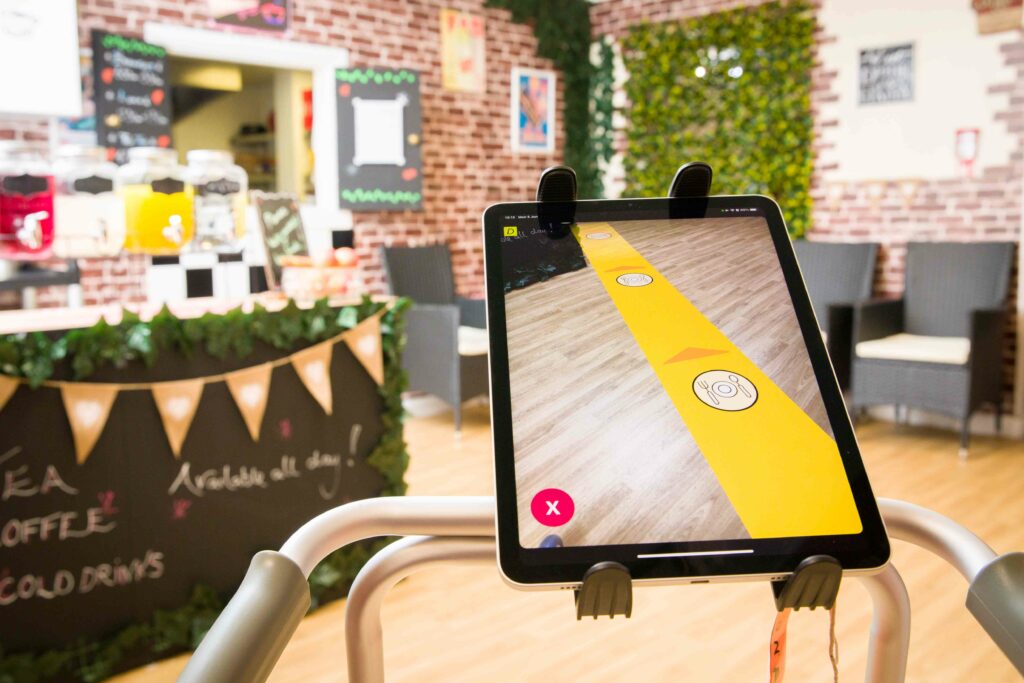
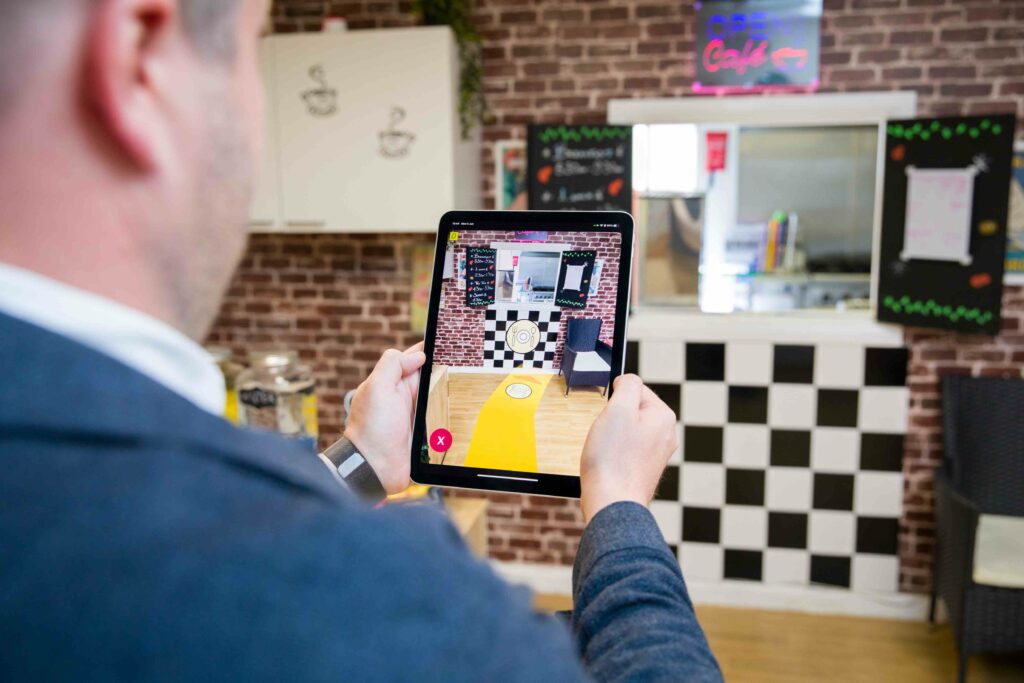
Enabling community spaces to become more dementia friendly for people with dementia or memory loss.
Introducing Dorothy
Dorothy is a company that develops technology for people living with dementia, using digital technologies to make everyday life easier for them and those who might care for them.
The Dorothy app uses augmented reality (AR) to create a digital yellow brick road, helping people navigate physical spaces with a dementia-friendly interface. It uses artificial intelligence (AI) to remind users of daily tasks while keeping them connected to their caregivers. It uses large, high-contrast icons to overcome language and education barriers.
The challenge
Care City published a landmark report on life in London for those with a diagnosis of dementia. People living with dementia told us they want to live independently, access their community, socialise with friends, and continue to participate in activities they enjoy. However, many we spoke to do not go out as they or those who care for them are concerned about the struggle to navigate places. Carers and professional care workers found it hard to support people in going to places without a lot of timely preparation, which they often didn’t have the capacity to complete.
In 2022, a Longitude Prize on Dementia was announced. They put out this call:
We are calling on innovators around the world to develop digital solutions that support people with dementia to remain independent for as long as possible.
We applied for the Prize, and Care City won the opportunity to develop ‘The Dorothy Community’. Our partners are Dorothy and TPXimpact, a digital transformation company that supports organisations in building a better future for people, places, and the planet through the power of human-centred design.
The Dorothy Community
Dorothy was originally designed to be used in care homes, supporting residents with mobility issues using a walking frame. Dorothy tested well with these users, and it was found to help support independent navigation around care homes.
Our vision was to create ‘The Dorothy Community’ which existed outside of the care home. People living with dementia could be supported by Dorothy, without the walking frame, to visit public buildings, community spaces, and commercial businesses. Venues would become more dementia-friendly, and, more importantly, people living with dementia would become more autonomous and independent.
The Longitude Prize on Dementia Discovery Award has allowed us to learn what people living with dementia really want and how important internal wayfinding is to them. We have also established the needs of the businesses and other organisations that would offer the Dorothy app. We have established how much work will be needed to move Dorothy from a prototype to a commercially available service. We have identified a path for future innovation to take Dorothy to the next level.
We have co-produced our findings and developed Dorothy with a range of people living with dementia, with a range of different subtypes of dementia, backgrounds, ages and experiences. We have tried Dorothy out in various venues and businesses to understand their unique needs and concerns.
Dorothy Frequently Asked Questions
What is the Dorothy App?
Dorothy App is an augmented reality (AR) aid for those living with dementia. Combining computer vision and artificial intelligence, Dorothy allows those with dementia to navigate care homes and public spaces independently using a simple tablet attached to their walker. Dorothy was co-founded by Ilya Rybin, software manager with 10 years of computer vision and location experience, and Dr. Samir Shah, practising neuropsychiatrist from London. In 2020 Dorothy won the SPARK Innovators award by the World Health Organization.
What is the Dorothy Community?
The Dorothy Community is based on the wayfinding ‘Dorothy’ app to enable people living with dementia to physically navigate through their community without support. It provides a digital yellow brick road for users, using AI and AR to provide a virtual pathway and simple instructions to help them find where they want to go and provide reminders of daily tasks, such as taking medication – all while keeping them connected to their care-giver.
What challenge does the Dorothy Community help solve?
In a recent evaluation of dementia services by Care City, a centre for healthy ageing, one consistent theme that came out was that people living with dementia cannot access their local community. They fear that they might get lost or be unable to locate important indoor locations such as toilets when they arrive. These practical issues prevent many from leaving their homes and can lead to increased agitation or depression.
Existing wayfinding technology is often complex and does not have the necessary level of detail, focusing on street level information rather than the room level information and simple iconography that people living with dementia need.
In addition health and care are stretched, we are hearing about additional strain on unpaid carers. The Dorothy Community relieves some pressure on these services by enabling people to live more independently, access their community, socialise with friends, and continue to participate in activities they enjoy doing.
What are the benefits of Dorothy?
Dorothy enables people living with dementia to physically navigate through their community without support. A yellow path shows directions and rich icons will explain the surroundings.
It also helps people with dementia maintain their independence by providing reminders of tasks and activities they may have difficulty remembering or completing independently, such as brushing teeth or taking medication. These reminders can be recorded in the voice of a family member or friend and set as scheduled reminders or notifications pushed from a smartphone.
And family or care providers can remotely monitor their loved ones movements, and communicate with them through the app.
How can the Dorothy Community support carers and family members?
When dementia becomes more advanced, movement and navigation are commonly supported using family, carer or healthcare professional support along with constant monitoring of the person with dementia. Feedback from some carers said they would like to take the person living with dementia to the local shops but are worried about the person losing contact and getting lost.
Care workers have also told us that one of the major barriers to accessing the community is a lack of knowledge of the locations they would like to visit. Some said they would go to a museum, for example, with a person living with dementia in their care, if they knew where the nearest lift or toilets are or a good place to sit for a few minutes but simply do not have time or resources to investigate each location before visiting.
How does Dorothy work?
Dorothy works like Google Maps for indoors. The app uses tablet camera and motion sensors to create a virtual map of the building or set of rooms. When the app “sees” the familiar map through the camera again, it can infer its position on this map with a very high precision (less than 1 meter of error). It can then show directions (something we call “yellow brick road”) to specific location on the map. For example, if you map your house using Dorothy, the app can then understand you’re standing in front of the couch and in order to get to the bathroom, you need to take the door to the left and straight up the hallway.
How did the idea for Dorothy come about?
Ilya Rybin, Product Manager, started developing Dorothy in his free time in 2018, having been inspired by his grandpa who passed away in 2008 after living with dementia in his latter years. His grandfather would get lost in new environments and always had to ask for assistance, something that was quite distressing for him. Samir started to help soon after and together refined the idea into a way of using common, but often discarded technology, into something that can thoughtfully and effectively provide assistance to maintain dignity.
Who has been involved in developing Dorothy?
The Dorothy app is developed under the oversight of Dr Samir Shah, Chief Clinical Information Officer, NELFT. The technical engine for the app is overseen by Ilya Rybin, who also works developing location technologies for Europe ride-hailing company Bolt
Care City is a community interest company that trials health innovations in the real world and has expertise in Personal and Public Involvement (PPI). Recent projects involve the NHS testbed evaluations and a London-wide service evaluation of dementia services for the London dementia clinical network. Care City CEO is Matthew Skinner, previously the CEO of FutureGov, a digital company that has successfully scaled products in the UK/Australia public and health sectors. Care City project lead Ben Williams was on the committee for the national NICE dementia guidance (NG97). He was also a national safeguarding manager and an independent mental capacity advocate.
TPXimpact is a digital transformation company supporting organisations to build a better future for people, places and the planet. With vast experience across data, design, experience and technology, they support public, private and third sector organisations deliver high-quality solutions that improve services, experiences and outcomes for people. Iain O’Neil is Managing Partner for Health at TPXimpact, with previous experience working for NHSX as a digital transformation director. David Robson is a Lead Service Designer, with previous experience in the area of healthcare as Strategy Advisor for NHS England. He has previously run an innovation healthcare fund and has experience in digital innovation methodologies.
How could the Dorothy Community be developed further?
We would like to make every community space in the UK (be it mall, daycare center, library or art gallery) accessible for people living with dementia. Every public space manager should be able to pick up Dorothy, map the premises, purchase a couple of tablets and by doing that make the location “dementia friendly” in less than a few days.
See Dorothy in action
The team behind the Dorothy Community


Care City


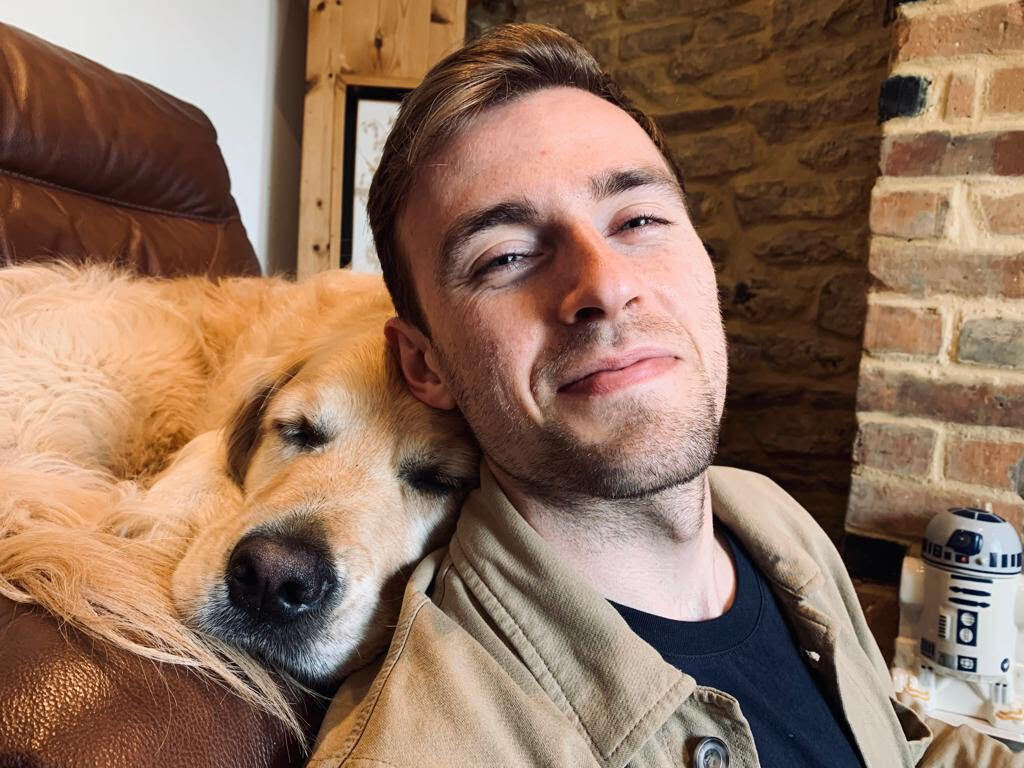

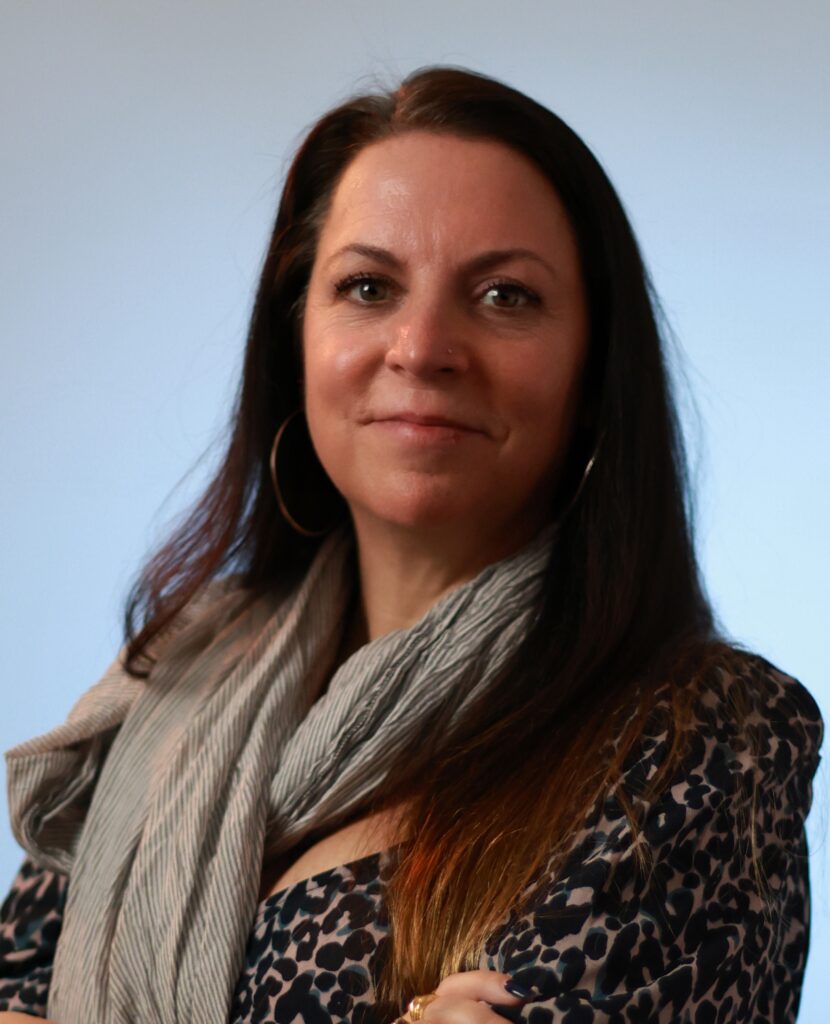
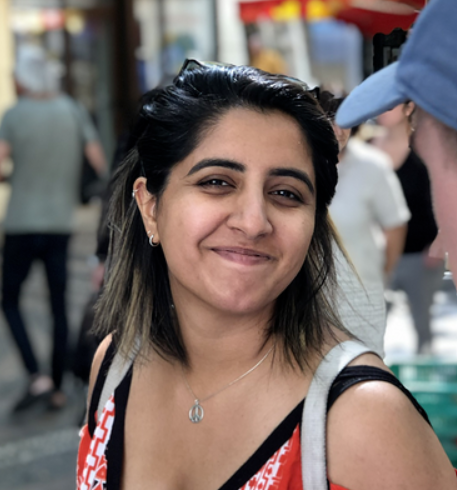
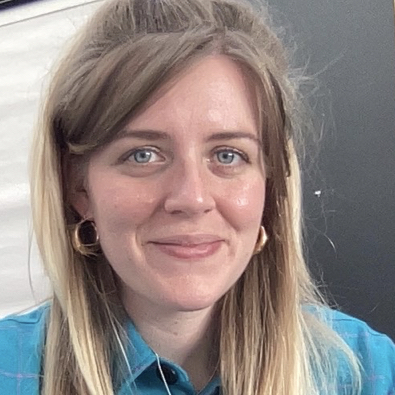
Get involved
If you are a venue that would like to offer this type of service, or a person living with dementia who would like to help us test Dorothy, please email us at LPoD@carecity.org
Living with Dementia in London
Our evaluation of the London dementia offer for the London Dementia Clinical Network identifies several other areas for improvement in services for people living with dementia and their carers living in London. It highlights the need for better coordination and communication between health and social care teams, as well as the need for more comprehensive training and awareness among care providers.
The report also emphasises the importance of early intervention and support for people living with dementia and their carers, including in-person reviews, access to counselling and therapy, and assistance with financial and legal issues.
Overall, the report highlights the need for a more consistent and compassionate approach to dementia care in London.
Find out more
To find out more about the Longitude Prize on Dementia and the 24 Discovery Award winners progressing to the semi-finals of the prize, visit dementia.longitudeprize.org or download our flyer.
“A few days ago I found myself following a yellow brick road around the offices of the Alzheimer’s Society in the heart of the City of London. Not a real one, you understand, this was an augmented reality app called Dorothy guiding me to the kitchen or the toilets once I had tapped on a symbol on a tablet computer”.
Read the full article in Rory Cellan-Jones ‘Always On’ newsletter

